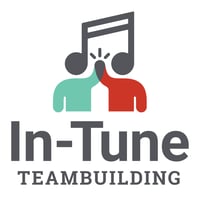The Forbes article is headlined "Lack of Employee Engagement? 10 Simple Ways to Improve Their...
Gratitude as a retention tool
Adweek has a nice guest column by Esther Raphael that touches on gratitude--as employers reshape culture in the post-pandemic world--as a significant retention tool. "Could the simple act of appreciating those around you, the moments shared and the work done, impact your culture in a monumental way? "
"...Through these workshops, we continue to learn that gratitude is not an end, but a means to drive human connection."
Similarly--our In-Tune Teambuilding workshops offer a human-connection experience. The shared experience of learning to play music, together, builds empathy and enhances communication. The one-day workshop is memorialized and celebrated after the fact, and those happy memories are a powerful magnet to retain employees.
"Experts say it (gratitude) not only creates a happier environment, but there is a solid business case for instilling a culture of gratitude: It facilitates employee engagement and a clear path to retention."
The column continues: "Employee engagement has a direct impact on job satisfaction and overall productivity. But in the 2022 Engagement and Retention Report from Achievers Workforce Institute, about 50% of workers said their company culture deteriorated during the pandemic due to lack of employee input, communication and connection.
The most enjoyable jobs—and likely the ones where people see the most success—are the ones where workers feel most engaged with the people around them. After all, we spend a lot of time with our colleagues. Think about the potential of an environment filled with only the most passionate, dedicated and engaged teammates—that’s the dream.
To get there, start by deepening connections on your team and throughout your organization. This can be done through casual outings or more formal workshops, as long as you’re able to have meaningful conversations during the time you spend together. Use those "moments to get to know the people around you in a new way. Practice this at a company level to connect cross-functional teams or even people who don’t often interact."



